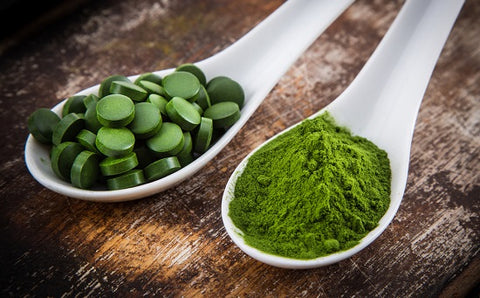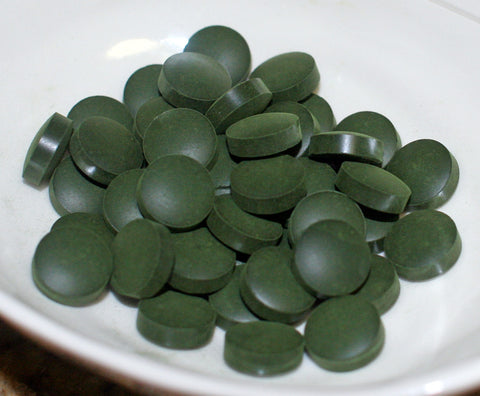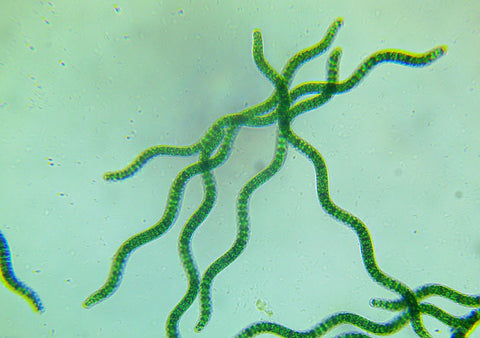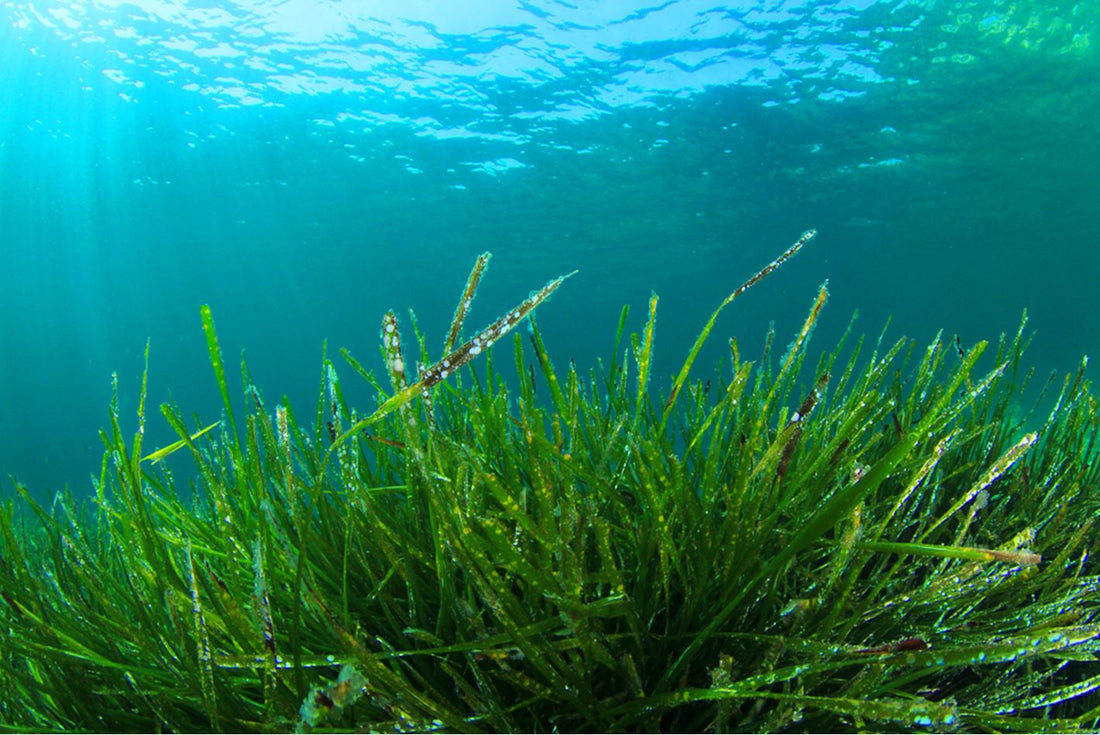Do you want an effortless way to eat some of your recommended 4-9 servings of vegetables each day? Are you trying to shield yourself from the stress, toxins, pollutants and chemicals of our world?
Then let's talk about Spirulina.
Imagine a plant that can nourish the body by supplying most of the protein you require to live, help prevent the annoying sneezing and sniffling of allergies, help you manage high blood pressure and cholesterol, reinforce your immune system, and help protect you from cancer.
What is Spirulina?
Spirulina is a colloquial term that refers to a blend of 2 bacteria, Arthospira Maxima and Arthospira Platensis, belonging to the cyanobacteria family. Sometimes these bacteria are known as Spirulina Maxima and Spirulina Platensis, respectively.

The common name Spirulina’ is derived from the Latin word for Spiral’ or Helix’, which is in reference to its classical-morphology being spiral shaped (although linear-shaped Arthospira has been noted). Spirulina, a simple, one-celled organism, is also commonly called an all-natural blue-green’ algae owing to its color and its sources. It grows in the surface of freshwater lakes and ponds with a high pH (alkaline) and after being harvested, you can purchase Spirulina in tablet, powder and liquid forms.
This deep green aquatic plant is recognized as one of the oldest life forms on earth. In fact, the microalgae is partly responsible for producing the planet’s atmospheric oxygen that billions of years ago allowed the earth’s originating life forms to develop. The Aztecs consumed Spirulina in 16th century Mexico for its abundant source of protein. The people of the Kanem empire used it as a food source over a thousand years-ago in ancient Chad. Today, it is renowned as one of the world’s most nutritionally-complete superfoods, thanks to its exceptional nutrient-dense composition and offering health benefits to virtually every organ and bodily function.
Spirulina gained popularity when NASA used-it as a dietary-supplement for astronauts in space. Spirulina did not come into commercial production up until the 1970s when one French company began the first large scale Spirulina production plant. Within a few years, Japan and America began producing their own Spirulina and it has since become a go-to superfood for various health issues. Spirulina powder has a slightly-smoky flavor which blends right into dressings, smoothies, soups and other foods.
Spirulina: A Complete Food?
Spirulina contains an unusually high-amount of complete protein, minerals, vitamins, and essential fatty acids. Nutritionally, Spirulina is technically a source of complete vegan protein which can be up to 70 per cent protein by weight though some interventions employ Spirulina with a 55 per cent protein content (more than chicken, beef, and soybeans), and with a relatively low carbohydrate composition of around 15% dry weight.
Spirulina’s amino acid composition is complete – 8 essential and 10 non-essential amino acids – (providing adequate amounts of all-essential amino acids – but is lower in methionine, cysteine, and lysine as compared to animal products.
Spirulina has high levels of GLA (gamma-linolenic acid), linoleic acid, arachidonic acid, beta-carotene, iron, calcium, phosphorus, vitamin B12, chlorophyll, nucleic acids RNA & DNA, and phycocyanin, a pigment-protein complex found only in blue-green algae. It also contains phycocyanin-containing phycobiliproteins that are thought to be some of the active ingredients in Spirulina.
Spirulina Health Benefits
Spirulina is a multi-tasking hero when it comes to your personal health. Bursting with nutrient treasures, the super-powder bestows everything from minerals and protein to vitamins and antioxidants.

Today, this nutrient-rich microalgae is being promote all around the world because of its incredible health-maximizing benefits. It’s a popular supplement for people looking to achieve optimal health. According to studies, Spirulina is successfully being used as a treatment for a wide range of heart health, metabolism issues and other related ailments, including diabetes, weight loss and high cholesterol as well as those who have been poisoned by arsenic contaminated water.
Spirulina Benefit 1: Mighty Protein Source
Extensive research has shown Spirulina to be a truly remarkable source of food, with its phenomenally high-protein content. Spirulina packs more protein per ounce/2-3 tablespoons (around 15 grams) than either soy or meat since it’s over 50% protein by weight. This complete protein-source provides all 9 essential amino-acids, aka the protein building blocks, needed by your body on a daily basis.
Spirulina Benefit 2: Essential Fatty Acids
Spirulina supplies a wide range of essential omega 3 and omega 6 fatty acids. Most notably, it is a rare food source of GLA (gamma-linolenic acid). This hard to find’ essential fatty acid is renowned for its anti-inflammatory effects and can reduce symptoms associated with allergies and arthritis.

GLA is also mainly beneficial to women, since it eases the symptoms of PMS. Gram-per-gram, Spirulina also has 26 times the calcium of milk, thereby making it an excellent nutrient supplement for pregnant women.
Spirulina Benefit 3: Helps Keep Eyes Healthy
Spirulina is an excellent nutrient supplement for people looking to improve their eye health. This microalgae is very rich in vitamin A, which is exceptionally important for healthy eyes. Spirulina actually has 10 times the vitamin A concentration gram-per-gram of carrots.
Spirulina Benefit 4: Detoxifying Agent
Many of the densely-concentrated nutrients in Spirulina help protect your body from stress and cleanse it from toxins. Toxins accumulate in the body as the by-products of the foods we eat and our environment. Since Spirulina is a rich chlorophyll source, one of nature’s most powerful detox agents, it can help remove toxins from the blood and deactivate the heavy metals and radioactive isotopes in your body by binding to them. This makes Spirulina very beneficial for people undergoing radioactive therapy
Spirulina Benefit 5: Improve the Digestive System
Spirulina eases waste passage through the digestive system, thus reducing stress on the entire digestive system. It also promotes healthy-bacteria in the digestive system, and helps improve dietary nutrients absorption.
Spirulina Benefit 6: All Round Nutrition
Spirulina boasts vitamins A through E as well as other minerals like potassium, calcium and iron – which energizes your body and helps fight fatigue. It is an abundant source of B complex vitamins, which support several of the body’s processes of metabolism. Spirulina is particularly rich in beta-carotene and vitamin K and is truly a health-seeker’s dream come true.
Spirulina Benefit 7: Easy-to-Digest
Spirulina is 85% to 95% digestible so it does not get any easier for your body to profit from this nutrient-rich food. Its cell walls contain no cellulose and so Spirulina is easy to digest compared to other common plants. This unique attribute helps improve the bioavailability of nutrients in the superfood, and in turn, optimizes health benefits.
Spirulina Benefit 8: Modulates Immune Response
Scientific studies on animals and humans show that Spirulina supports immune function, antibody production and T-cell proliferation. The blue-green algae has long been revered for its capacity to strengthen the immune system. Since it actively promotes regeneration of cells, it helps quicker healing of wounds, and makes recovery from ailments occur faster. Spirulina will also fortify your immune system, leaving you less likely to experience flu, colds, and other contractible illnesses. These studies also show that Spirulina has anti-inflammatory properties.
Spirulina Benefit 9: Antioxidant Treasures
Spirulina is known to contain phyto-nutrients with strong anti-oxidant properties which support cellular health through protecting the DNA and cell membranes from damage by reactive oxygen radicals. With up to four times the anti-oxidant concentration of blue berries, Spirulina has a surefire attack plan against tissue-damaging free radicals linked with health issues. It is a natural food source of beta carotene, which then converts to vitamin-A in the body, and can help promote healthy skin and eyes.
Studies have shown that Other Potential Health Benefits include:
- Help your body fight infection
- Destroy infected and cancerous cells
- Inhibit allergic reactions
- Raise your HDL (good cholesterol) levels
- Lower your Cholesterol
- Fights obesity
How to take Spirulina & Dosage
It is recommended to take 2g to 6g of Spirulina each day with a glass of water. Spirulina effects can be felt even in weak dosage (800 mg). Spirulina can be taken with a good glass of water, although fruit or vegetable juices can just as well be great.
Spirulina Side Effects
Spirulina is a safe and effective superfood to use, which is highly digestible. Because it’s derived from a naturally-occurring algae, it doesn’t produce any potentially risky side effects, but the recommended dosage mustn’t be exceeded.

Spirulina can provoke more than a few light side effects, by virtue of the fact that Spiriulina detoxifies the body. It’s thus recommended to begin with weak doses, which should be gradually increased. Spirulina can also provoke light fever or migraines; for some it can cause constipation, while for others diarrhoea (mostly in strong doses).
Suprilina does contain iodine, so people allergic or sensitive to iodine should always avoid taking it and look for suitable alternatives.
If you are breastfeeding or pregnant, talk to your physician before trying it.
Individuals with autoimmune diseases such as rheumatoid arthritis, multiple sclerosis, or lupus should avoid the algae since it could over-stimulate the immune system. In addition, people with the metabolic condition PKU need to also avoid it as they may not be able to properly metabolize its amino acids. It is highly recommended that you take supplements only under the supervision of a knowledgeable-health professional.
Should You Take Spirulina?
Spirulina is undoubtedly nutritious. The aquatic microalgae may offer a valuable protein source, especially for vegans. If you are viewing it as a kind of vitamin supplement, then it may be on the expensive side—and does not provide anything you can’t obtain from a healthy diet.
If cost isn’t an issue and it makes you feel better to add a scoop to your smoothie, it definitely won’t do any harm. Unlike most plants, that need to be cultivated and taken care of, Spirulina is a survivor, and is able to withstand extreme temperature disparities and neglect and still thrive.



